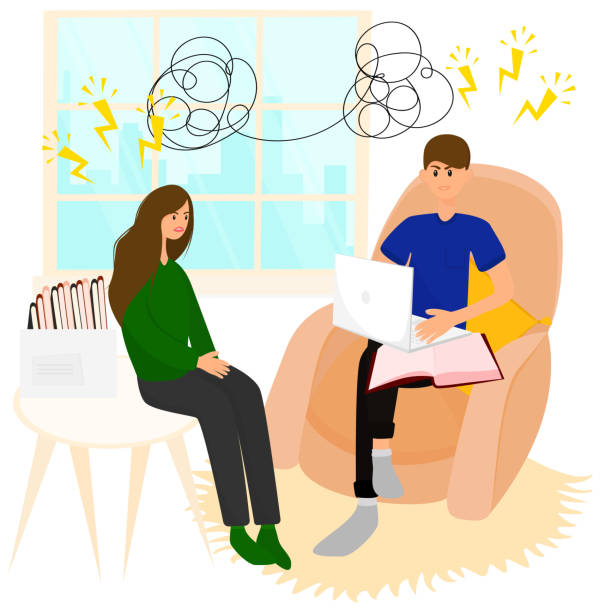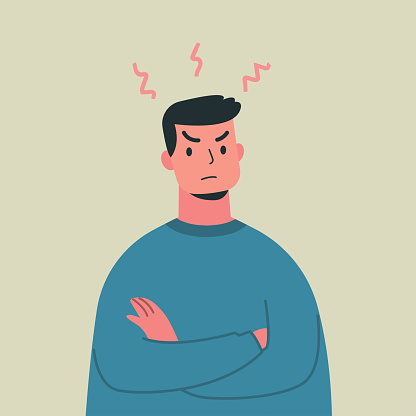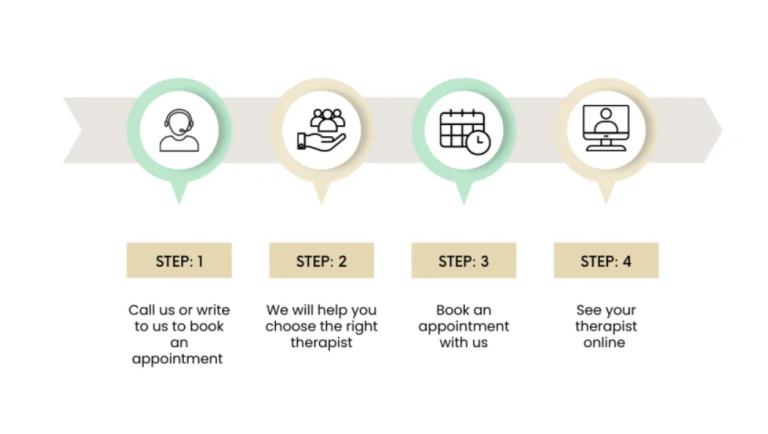
Therapy for Anger Management
Do you control your anger, or does your anger control you? Therapy for Anger Management can be an safe and supportive space to deal with your anger issues and lead a calmer, balanced, and positive life.
35000
Sessions
22+
YEARS EXPERIENCE
500000+
LIVES IMPACTED
What Is Anger?
Anger is an emotion that arises when you feel someone and something has hurt or wronged you in some way. It can also come up when things go out of plan, control, or get overwhelming. Like, feeling angry when a friend betrays your trust, or when you’re stuck in traffic on your way to an important meeting.
It is completely okay to feel angry when life gets tough. Like feeling sad or joyful, anger is also a natural part of being human. It is like a signal that tells you that something requires your attention- like when someone crosses your boundary, or when you find a situation to be simply out of your control.
While that surge of anger can sometimes help you solve and tackle your problems, it can also often feel overwhelming and lead to behaviours that hurt yourself and the people around you.
Anger can often negatively affect your interpersonal relationships. Therefore, if you feel like your anger is taking the wheel, talking to a therapist can be a great way to manage anger issues effectively by knowing your triggers and learning healthy coping strategies.
What Causes Anger Issues?
Anger issues can stem from a mix of internal and external factors. Mental health conditions like depression or anxiety, learned patterns from family, or negative coping mechanisms can also contribute towards it. Biological factors like brain chemistry or chronic pain can play a role, as well as external stressors like financial struggles, work issues, or relationship problems.
At the heart of it, while it might seem like anger itself is the root cause, it’s often a mask for other, more vulnerable emotions. Think of it like a shield protecting deeper feelings like sadness, disappointment, or hurt.
For example, imagine feeling frustrated with your partner who doesn’t seem to understand your needs. Instead of expressing the hurt or sadness you might feel underneath, anger becomes a more “direct” way to communicate your discomfort. It’s a way to say, “Hey, this is important to me!” without feeling vulnerable.
However, expressing emotions differently doesn’t mean one way is better than another. Both men and women may experience anger, but how they express it can vary. Some might express it outwardly, while others might use sarcasm or become withdrawn. It’s important to remember that these are just different ways of coping, not inherent personality traits.

Signs And Symptoms of Anger Issues
Feeling lost and confused by your anger? Anger can often be a complex mix of physical sensations, thoughts, and feelings, and it can be tough to pinpoint your feeling as anger. We have noted a few ways you can notice anger so that you become better at identifying it.
When you are better at identifying your anger issues, you move one step closer towards managing them. With the help of therapy for anger management, you learn about these cues of anger and gain a clearer perspective on your inner-experience.
Thoughts of Anger
Anger can make you have thoughts such as:
- They did this on purpose!
- This is the worst thing that has ever happened!
- Everything is going to fall apart!
- No one cares about me!
- They should have done it this way!
Feelings of Anger
Since anger carries heavily-charged thoughts, it can also cause you to feel:
- Irritated
- Frustrated
- Overwhelmed
- Hopeless
- Resentful
Physical Signs of Anger
Anger shows up in the body as:
- Clenched fists and jaw
- A pulsating tension in your head and temples
- A tightness in your chest
- A rapid heartbeat
- Feeling warm and sometimes sweaty
Behaviours of Anger
Anger can be taken out in the form of:
- Harsh language
- Yelling, shouting
- Self harm
- Restlessness
- Substance abuse
- Cutting off communication
- Distancing yourself from others

Therapy for Anger Management
Anger can feel like you are constantly living on edge and struggling to find inner peace. It can strain even the strongest of relationships, leaving you feeling misunderstood and isolated. Having anger may make you feel self- doubt and self loathing. You may carry some shame for always losing your control and feel like you are the problem.
Often the real challenge with anger management is that people who feel angry have had little or no space to process the underlying emotions. There may be underlying hurt, bitterness, resentment or even grief. There may also be trauma underlying anger.
Therefore managing anger is not just about increasing control over yourself, but developing a real understanding and a relationship with your anger and learning to be compassionate to yourself first. Remember being compassionate to yourself doesnt mean justifying your anger. Justifying it only moves the emotion into a more mental, analytical space and often that doesnt help much.
Holding all that anger can feel like a burden and trying to manage it alone can feel daunting. If you fnd yourself in an overwhelm due to anger with your relationships getting impacted, therapy for anger management may be for you.
A therapist can create a safe, non-judgmental and supportive space that is needed for exploring the deeper aspects of anger and healing the deeper unseen hurt and pain that you may be carrying and that is getting expressed as anger.

Seek Counseling for your Anger Issues
Counseling can be a great tool for you to manage and overcome your anger; and lead a happy, balanced and positive life.
We are here for you.
When Should You Seek Counseling For Anger Issues?
Sometimes, it can be easy to understand and be in control of your anger. Sometimes, it can be overwhelming and negatively impact your life. In such cases, therapy for anger management can be a great option. Here are some signs that seeking therapy for managing anger can be beneficial.
- Your anger is unmanageable. You lose your cool often, and feel like your anger comes up in situations it is not required.
- You anger has impacted your relationships negatively. Anger has become the fuel causing the conflicts in your relationships, and you feel like people are avoiding you because of your anger.
- You feel the physical effects of anger, like panic attacks, anxiety, tiredness, and unexplained pains.
- You feel like things go from a 0 to a 100 very quickly, you may be feeling okay and relaxed one moment, and a small trouble can make you feel extremely frustrated and angry, making it difficult to identify what triggered you in the first place.
- You have started to feel guilty and ashamed of your anger outbursts.
Anger can seep into other emotions like joy and sadness, taking away your opportunity to experience an emotionally rich and fulfilling life.
Seeking therapy to manage anger can foster and restore peace and positivity back into your personal life and relationships.
Benefits for Opting for Anger Management

By choosing therapy for anger management, you gain the following benefits:
- Feel more in control of you anger and other feelings.
- Understand the root cause of your anger
- Develop healthy and sustainable coping mechanisms to deal with anger
- Restore connection in your interpersonal relationships
- Live a well-balanced, happier, and relaxed life
Some Simple Anger Management Techniques
Not ready for therapy yet?
Here are some simple anger management techniques you can try on your own:
Take a time out: Remove yourself from the situation to take a breather. Sometimes, it can be best to avoid saying something that could worsen the situation. So, in such situations you can take a time-out to relax, drink water, or go for a walk to feel more calm.
Try Mindfulness: Mindfulness is a practice that helps with noticing your emotions, bodily sensations, and thoughts, without any judgement. Often, when angry, you may make judgements about your anger, like how it is bad and wrong it is to feel angry. Mindfulness helps you to take away these judgements and watch anger for what it truly is- just a feeling. Through mindfulness, you also develop self-compassion and awareness about your anger which can help you overcome your anger issues.
Use Relaxing Breathing Techniques: Using breathing exercises can signal your body to start its relaxation process. When you are feeling the anger rising, try techniques like square breathing to gently bring down your anger to a more manageable level. To practice square breathing, simply breathe in four counts, then pause for four counts, exhale for four counts, and then hold your breath for four counts, and you complete one round of square breathing. You can try this for how many times as you need it till you feel more settled and relaxed.
You are not defined by your anger. It’s simply one part of you, just like your joy, laughter, and other emotions. It deserves understanding and acceptance, just like any other feeling.
Sometimes shame often gets intertwined with anger making you feel like you are flawed. But, consulting a therapist and taking therapy for managing anger peels away the shame that binds the anger, and will help you look at it from an unbiased, clear perspective. A therapist helps you unearth the story behind your anger, opening up the door towards inner awareness, self-compassion, and happiness.
Meet Our Therapists & Counselors and Book an Appointment
Our therapists are all trained psychologists qualified in helping people work through their difficulties. We work with individuals across different populations. We use an eclectic range of psychotherapies from solution oriented to insight oriented to holistic meditative approaches, depending on the need and comfort of the clients.
"What Our Clients Say about Our Online Counseling Services"








